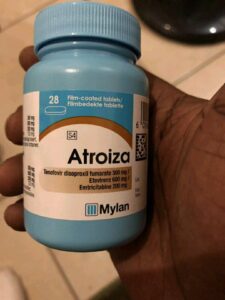Aya Care’s Sudden Fame | The Republic

Another one of such initiatives is Clarke-okah’s own brainchild, Femme Avenue. ‘Femme Avenue is a social enterprise. We operate on the 50 per cent profit business model so that we are able to provide sanitary products for young girls and women who cannot afford to get them for themselves,’ Clarke-okah said. Along with combating period poverty, Femme Avenue spearheads initiatives to ease social stigma including Femme Tribe, which helps to rehabilitate troubled young girls back into society, and Femme Community, where women and young girls can talk about the difficulties they face with their periods. However, despite their breakthroughs, Clarke-okah acknowledges that there is still a long way to go because of societal stigma. ‘We currently still find it hard to talk about menstruation openly because of the shh shh mentality,’ Clarke-okah reveals.
Even when we have conquered the stigma and economic pitfalls, menstruation remains difficult with its associated cramps and consequential hormonal imbalance. About 80 per cent of women experience dysmenorrhea—pain associated with their period—in their lifetime. However, severe pain enough to disrupt one’s daily life should not be taken lightly. Some causes of extreme period pain are endometriosis, uterine fibroids, adenomyosis, and pelvic inflammatory disease. Yet these issues are often not accurately diagnosed, especially in Nigeria. Instead, women and girls who complain about severe pain are ignored and left to suffer in silence.
In Nigeria, menstruation also comes with a host of additional cultural problems. Some communities marry off their daughters once they’ve begun menstruating because it is seen as a sign of maturity—a worrying reality when considering that most girls begin their period between the ages of 12 and 15. Some communities hide women away when they’re on their period because they’re seen as impure or useless. Parents also shy away from talking about reproductive health with their daughters and sons which further exacerbates the issue.
With such intricately rooted societal and cultural stigma, the popularity of Aya Care pads has also spearheaded a social movement. Rather than a thing to be ashamed of, people have posted their Aya Care pads as a badge of honour. Some even posted the pads they gifted to or were gifted by their loved ones. Valentine’s Day boxes were filled with Aya Care pads and social activists and organizations buy in bulk to distribute to the underprivileged. Femme Avenue has also switched solely to Aya Care pads for their social work. According to Clarke-okah,
The design of the packaging is magnificent. It is beautiful. When you first see it, you want to know what it is, so that aspect of their marketing is top notch. After seeing such a beautifully packaged product and then you proceed to try it and then it beats your expectation—you don’t get rashes, you don’t have leakages, and everything is fine—you will naturally talk about such a product.
Lica also asserts that packaging is one of the factors attracting people, including men, to the brand. According to her, Aya Care doesn’t engage in active marketing and everything we see online is organic. While period stigmatization is a persistent problem in Nigeria, Lica is confident that it is something her customers can challenge. According to Lica, the silver lining is the beautiful package that encourages men to join in on the conversation and purchase the pads for the women in their lives.
However, she never imagined the virality they received. Lica says, ‘I was very humbled that it got noticed by thousands of women.’ She also shared that it’s an experience that moved her to tears. ‘I cried.’ Seeing the reception that the brand received made her think, ‘Yes, we finally got our first break…It’s been two years, and the validation was that we’re doing the right thing. We’re moving in the right direction.’
But not everyone is on the Aya Care pad bandwagon. Some users on X have shared their thoughts on how they remain loyal to other brands such as Mopled, saying they either don’t understand the hype around Aya Care or it just didn’t work for them. So far, the major deterrent is Aya Care’s absorbency. X user, @MissMotunrayo2 wrote about the brand, ‘For my heavy flow girlies Aya pad is not the one for you. The length is very perfect but it doesn’t absorb.’ Another X user, @anike_akoriola, shared, ‘The most popular review I have gotten so far is that Aya Pad doesn’t absorb, it’s not a good idea for heavy flow, but the length is good.’
But Lica isn’t deterred by the negative reactions. ‘It’s natural,’ she said. ‘There’s no way we’re going to make every single woman happy.’ Instead of focusing on trying to appease these comments, Lica is rather determined to create more choice in the industry. To people who don’t like the brand, she’s open to discussing what can be done better. Or if they’re happy with the brand they currently use, she’s glad too. The focus, according to Lica, ‘[is] giving a lot of women a beautiful choice.’
Furthermore, Lica felt confident that Aya Care is on the right track and referenced that the brand is always sold out. As foreseen by Tamara and Clarke-okah, those who have tried the brand remain loyal and defend Aya Care. Still, some find common ground to celebrate the brand while asking for improvements.
Lica only encourages people to try out the brand before leaving a comment. She explained that this is because she believes that some influencers have been paid to say negative things about Aya Care pads. She also added, ‘When [Aya Care] reaches out to these people, they block our comments and DMs instead of backing up their initial statement.’
According to Lica, Aya Care has been taking up a big share of the market from competitors such as Molped and Always, who have been present in Nigeria since 2019 and 1984 respectively. She shared that she’s had experiences where customers call in saying they couldn’t find Aya Care products in stores—although these stores had been supplied. She claimed that ‘some of the store personnel are being paid by competitors to hide Aya Care products.’
These issues are often flagged by their customers and according to Lica, it’s this involvement in the brand that drives her to her customers even more. ‘These women are fantastic, and I will do anything for them.’
Lica told me that while she is yet to face Aya Care’s biggest challenge, she thinks it’s coming. Aya Care has been under the radar for some time, so naturally, major problems were not bound to arise. Lica felt that their recent virality will attract a host of problems, some of which she has begun to see with their products being hidden in stores.
Still, Lica keeps her eyes on future. She shared that Aya Care is planning to expand its product offerings to more diverse pads and tampons. An area she also hopes they can address is how to distribute across Nigeria. Currently, the high cost of fuel makes it difficult to supply to places such as Northern Nigeria. Lica notes that a box of Aya Care pads costs N650 but delivery charges to supply to the North go up as high as N20,000.
According to Lica, the ideal pad will be affordable, highly absorbent, and sustainable. However, realistically, ‘something has to give’. Because of the price point, Lica explained, it has been difficult for Aya Care to become completely sustainable. But this isn’t stopping them from trying. While she’s aware that Aya Care can’t solve every problem, especially given its young age, Lica asserts that the brand has already made strides to improve its sustainability. For packaging, they currently use cardboard boxes, a plan agreed upon since the brand’s ideation. With this gesture, while appearing small, Lica noted that they use ‘30 per cent less plastic than competitors’. Aya Care is also looking into using soluble plastics. Lica explained that it’s one plan she hopes competitors imitate for the overall wellbeing of the environment.
Between Molped, Always and Aya Care, a ‘big three’ seems to have emerged in the Nigerian menstrual health industry. And among them, Aya Care boasts of a fiercely loyal customer base that understands the importance of the impact the brand now has on society.
When I asked Lica what she believes drives the loyalty of Aya Care’s customer base, Lica highlighted the product and honesty. She said with regards to the product, ‘If your product is not good enough, they’re not going to come back.’ She also mentioned that Aya Care is completely honest about their operations and that the customer service team is encouraged to speak freely with customers.
Aya Care is making its mark in the menstrual health industry. Past practicality, their design appeals to their audience in a way that other brands seemingly cannot. They have taken care to create a product that is both visually appealing and efficient, with customers like Shirley asserting that the packaging was ‘giving’ and of high quality. So far, they have listened to what their audience wants and there’s no reason they won’t continue. The affordability, beauty and quality of the pad make it tick all the necessary boxes, becoming a powerful tool to fight the most pressing issues facing menstrual health in Nigeria—even countering deep-rooted societal stigma. Aya Care’s continued advancement and success are important not only for the brand and its immediate stakeholders but also for the Nigerian menstrual health industry⎈








